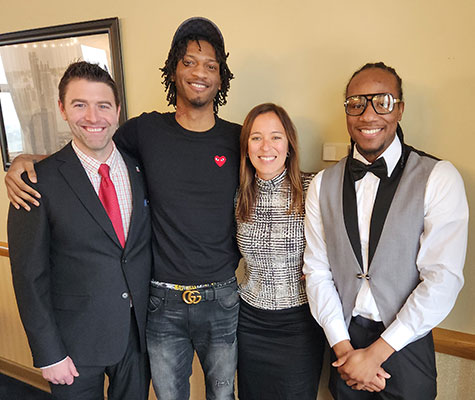Read the original published article here
Different situations. Different backgrounds. Different races. Different traumas. Different struggles.
Yet the four young men facing the audience in the Sky Room of the Holmes Student Center do share one reality – and, for many, it’s potentially insurmountable.
Prison.
Two already have left the Illinois Youth Center of St. Charles behind, their sentences complete, their release dates come and gone.
Remaining, though, are the stereotypes and the doubts: “You look at somebody who’s done something and assume, ‘OK, that’s who they are. They can never come back from this. They’re this type of person at the end of the day.’ ”
For the others, incarceration remains their daily existence.
“Being locked up, you miss so much in life. It’s rough,” one says. “You miss holidays. You miss birthdays. You miss people being born. You miss people dying. You miss life, you know.”
Also bonding the four young men – and the reason behind their Feb. 16 panel discussion on the NIU campus – is Project FLEX.
Launched in 2018 by NIU Department of Kinesiology and Physical Education faculty Jenn Jacobs and Zach Wahl-Alexander, the initiative provides exercise and life lessons through sport.
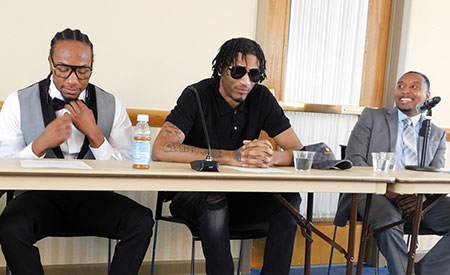
Malcolm Turner, Diasee Scott and St. Anthony Lloyd
Since then, it has grown in size and scope, adding the Illinois Department of Juvenile Justice’s facilities in Chicago and Warrenville to its original headquarters in St. Charles, where “alumni” and panelists Diasee Scott and Malcolm Turner first became involved.
Meanwhile, FLEX not only delivers its positive impacts behind the secure walls but now transports some of its participants on one-day field trips to NIU, where they can glimpse possible futures far removed from their mistakes of the past or the “cottages” they currently call home.
What is clear from their stories is that FLEX has played a foundational role in working to overcome their difficult circumstances.
Engaging with the professors and their team of graduate students has given them a “different mindset,” they say. “A better opportunity.” “Something to work toward.”
FLEX is family. FLEX is connection. FLEX is communication. FLEX clears heads and burns away stress. FLEX helps to control anger. FLEX is aspirational. FLEX focuses on the positive. FLEX makes the best of a bad situation.
“Incarceration doesn’t feel normal. You know things aren’t normal,” one current participant says. “When you go to FLEX, and you talk to these people who are normal – going to college and doing things you see on TV – the fact that I can just talk with them and be able to talk about random things, it makes you feel really, really normal.”
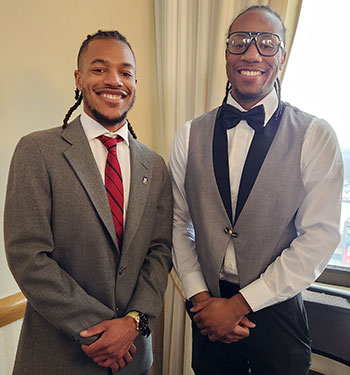
Project FLEX graduate assistant Izaiah Webb and Malcolm Turner
He is introspective about why he embraces the program.
“One of the reasons we’re able to get so close to the FLEX people is ’cause they come in and they don’t push theirselves on you. If you want to sit there on the corner and just watch, they’re going to let you sit there on the corner and just watch. They respect that. They hope that you’ll join, but if you don’t, they respect it. They not going to push nothing on you,” he says.
“I feel like a lot of kids incarcerated have trust issues, so, you know, you’re not going to trust them right off the bat. It took me a while,” he adds, “but me seeing that they’re consistent – they’re coming consistently – and they at least say, ‘Oh, hi, how are you doing?’ and the fact that even sometimes they remember my name, that shows me, ‘OK, they’re here,’ and just being there and not pushing theyselves on me eventually attracted me to it.”
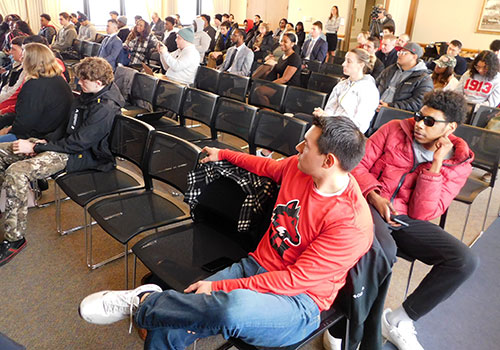
Panel discussion audience members listen to the stories of Project FLEX.
“You have to be present to be able to make an impact. You can’t say that you want to do the work and not show up. You can’t show up and not do the work – because, if you’re not, not only do you lose the respect, you lose the work and all the work you may have built up until that point,” Lloyd says.
“If Project FLEX was to stop coming in, and not do the work, and then show up a month or two later, the kids are going to be looking at them like they’re foreign, and they’ll have to rebuild those same relationships,” he adds.
“You have to show these kids – these youth – that you really care, and if you don’t, they’ll see it and they’ll call you out on it, and once you lose that trust, nine times out of 10 it’s hard to get it back.”
But FLEX continually steps up to the plate, Lloyd says, and its basis in sport demonstrates “resiliency, losing, how to bounce back, setting goals for yourself before and after the game.”
“They come in every week. Every week, even through the summer. They come in and they give kids experiences. They’re trying to build every day. They’re not coming in with 20 doughnuts and like, ‘Here. Play basketball. Eat the doughnuts.’ They’re coming in and building these friendships and these partnerships when they take them to NIU and when they take them to play pickleball,” he says.
“Let’s be honest. There ain’t no pickleball courts in the ’hood,” he adds. “But they teaching them something that’s outside of their realm, and giving them that experience so that they can learn from it. I think that’s powerful, especially when we take them off-grounds and get them to see things they may not have done.”
Demonstrating trust is important: One counts the field trip to NIU as his favorite FLEX memory “because it showed us the trust they put in us.”
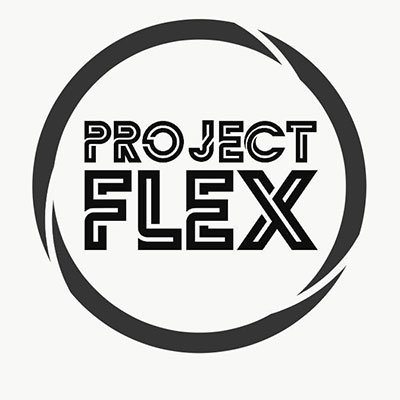
Another FLEX alum appreciated being treated “like an actual person. They don’t look at you as far as your situation and what you’re going through. They treat you as an individual and respect your privacy. They respect your opinion.”
Caring matters as well.
“It’s real life in there. It’s not every-day aggression. There’s other feelings. You got people who depressed. You got people who down and everything,” one says. “But you also got people who are looking to do better. It’s not like everybody’s just like, ‘Oh, yeah, I’m going to do this for the rest of my life. I don’t care about life.’ Like, no – we still care, but we want to somebody to show us that they care also.”
More than that, he adds, is genuine concern and commitment.
“Everybody wants to look at the problem, but nobody wants to look deeper into, ‘What is making them do this? Why is this normal for them?’ Nobody cares about that. They look at the problems and are just like, ‘Oh, they’re a problem. But what is making them make them problems? There’s got to be something in them,’ ” he says.
Unfortunately, he adds, for most youth who wind up behind bars, “there’s no resources to tell you different.”
“Growing up, you see murders. You see shootings. You see stuff like that, so that’s your normal. Nobody cares that that’s our normal a lot of the time,” he says. “That’s not normal – I’m starting to realize that now – but, c’mon, that’s the real reality in the ’hood, you know, and nobody don’t really care about that, I feel, and that sucks.”
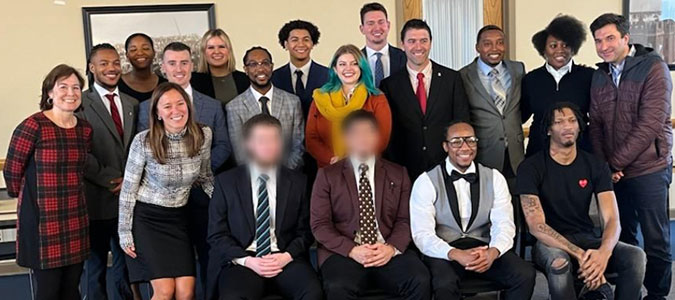
Questions, too, contribute to the FLEX process: What do you want to do with your life?
Turner knows now, planning to open a landscaping business. Scott wants to own and operate a recording studio to produce his own music and the music of others. He’s also contemplating an NIU degree.
For the others, the future means release.
“Am I gonna run out the gates?” one wonders. “How am I supposed to feel in that moment?”
He is more certain of how he feels now, however, and how he will feel once the facility is in the past and not the present.
“Before I got involved with FLEX and everything, I was like, ‘You know, it is what it is. I’m gonna die in the trenches, and I’m gonna go down. That’s what it is. There’s nothing more to life,’ ” he says.
“And now seeing things, doing things, getting involved in things, talking to normal people – as I call them – made me realize like, man, I could live another life other than what I’ve known my whole life. I could do something different,” he adds. “That’s what it is
